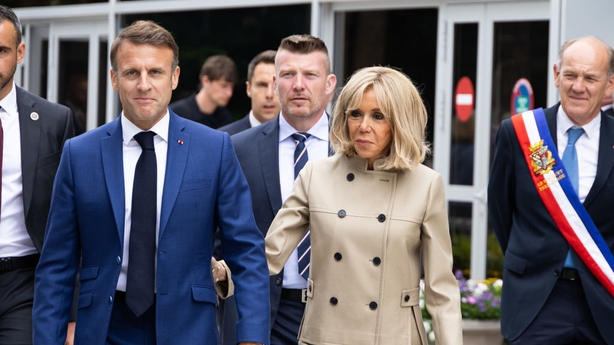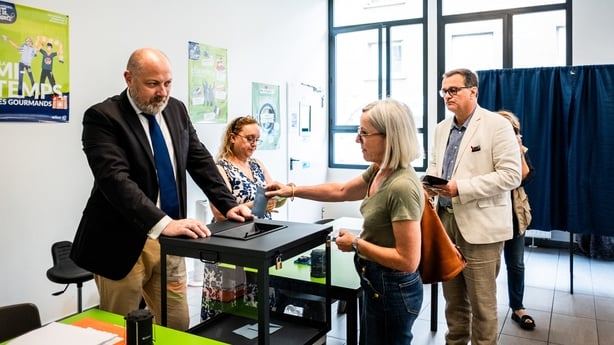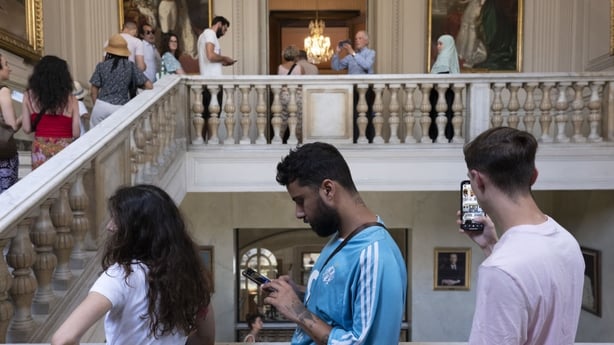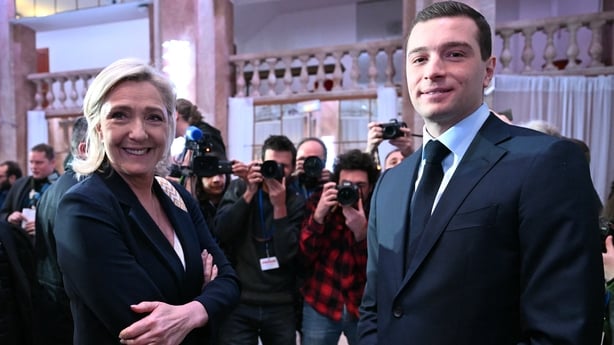Marine Le Pen's far-right National Rally (RN) party emerged ahead in the first round of France's parliamentary elections, exit polls have shown, but the unpredictable final result will depend on days of horsetrading before next week's run-off.
The RN was seen winning around 34% of the vote, exit polls from Ipsos, Ifop, OpinionWay and Elabe showed.
That was ahead of leftist and centrist rivals, including President Emmanuel Macron's Together alliance, whose bloc was seen winning 20.5%-23%.
The New Popular Front, a hastily assembled left-wing coalition, was projected to win around 29% of the vote, the exit polls showed.
The exit polls were in line with opinion polls ahead of the election, but provided little clarity on whether once next Sunday's second round is concluded the anti-immigrant, eurosceptic RN will be able to form a government to "cohabit" with the pro-EU Macron.

The RN was seen winning the most seats in the National Assembly, but only one of the pollsters - Elabe - had the party winning an absolute majority of 289 seats in the July 7 run-off.
Experts say that seat projections after first-round votes can be highly inaccurate, and especially so in this election.
Speaking after the exit polls, Ms Le Pen called on voters to give RN an absolute majority in the second round of parliamentary elections so party chief Jordan Bardella can become premier.
"Nothing is won and the second round is decisive," she told supporters. "We need an absolute majority so that Jordan Bardella is in eight days named prime minister by (President) Emmanuel Macron."
We need your consent to load this rte-player contentWe use rte-player to manage extra content that can set cookies on your device and collect data about your activity. Please review their details and accept them to load the content.Manage Preferences
French Prime Minister Gabriel Attal urged voters not to give the far right "a single vote" in the second round of voting.
"The far right is at the gates of power," Mr Attal said, warning that the party risked winning an absolute majority.
"Our objective is clear: to prevent the RN from getting elected in the second round. Not a single vote must go to the National Rally," he added.
French turn out in large numbers
Voter participation was high compared with previous parliamentary elections, illustrating the political fervour Macron aroused with his stunning decision to call a parliamentary vote after the RN trounced his party in European Parliament elections earlier this month.
A week of political bargaining now lies ahead.
With Russia's war against Ukraine in its third year and energy and food prices much higher, support for the anti-immigration and eurosceptic party has surged despite Mr Macron's pledges to prevent its ascent.
The two-round vote could put the far-right in power in France for the first time since the Nazi occupation in World War II.
Polls closed at 5pm Irish time in small towns and cities, and at 7pm in the bigger cities.
With the French facing their most polarising choices in recent history, turnout soared, with 59.39 percent casting their vote by 4pm Irish time, the interior ministry said, some 20 points higher than at the same stage in the last such polls in 2022.
This would equate to a final turnout of 67.5-69.7% when polling stations close this evening, the highest participation in a regular format legislative election in France since 1981, according to projections by several polling organisations.
The final turnout in 2022 was just 47.5%.

Presented with a crucial choice about France's future, many said they could not stay home, while political observers pointed to the highest voter turnout in decades.
In the southern city of Marseille, Nabil Agueni said he skipped the European elections but voted today.
Mr Macron and his wife Brigitte cast their ballots in Le Touquet in northern France, with the 46-year-old president seen taking selfies and mingling with supporters.
Ms Le Pen's party has a high spending economic programme and seeks to reduce immigration.
If the RN does win an absolute majority, French diplomacy could be headed for an unprecedented period of turbulence, with Mr Macron - who has said he will continue his presidency until the end of his term in 2027 - and Mr Bardella jostling for the right to speak for France.

France has had three periods of "cohabitation" - when the president and government are from opposite political camps - in its post-war history, but none with such radically divergent world views competing at the top of the state.
Mr Bardella has already indicated he will challenge Mr Macron on global issues.
France could change from being a pillar of the EU to a thorn in its side, demanding a rebate of the French contribution to the EU budget, clashing with Brussels over European Commission jobs and reversing Mr Macron's calls for greater EU unity and assertiveness on defence.
A clear RN victory would also bring uncertainty as to where France stands on the Russia-Ukraine war.
Ms Le Pen has a history of pro-Russian sentiment and while the party has said it would help Ukraine defend itself against Russian invaders, it has also set out red lines such as refusing to provide long-range missiles.
Split vote
According to most polls, the RN party is on course to win the largest number of seats in the National Assembly, parliament's lower house, although it remains unclear if it will secure an outright majority.
Final opinion polls have given the RN between 35% and 37% of the vote, compared to 27.5%-29% for the left-wing New Popular Front alliance, and 20-21% for Mr Macron's centrist camp.
Mujtaba Rahman, Europe head at Eurasia Group, a risk consultancy, said turnout was key to the outcome of the election.
"The higher the turnout, the more candidates qualify," he said on X.
He said that the left-wing alliance and Mr Macron's centrist camp would be able "to make deals to withdraw worst-placed candidates and allow the others a free run against the far right candidate" in the second round of voting.

The New Popular Front includes a wide range of parties, from the moderate centre-left to the hard-left, eurosceptic, anti-NATO party France Unbowed, led by another of Mr Macron's opponents, Jean-Luc Melenchon.
How the poll numbers will translate into seats in the National Assembly is hard to predict because of how the election works, professor of political science at the University of Nice and the Ecole Polytechnique Vincent Martigny said.
Candidates can be elected in the first round if they win an absolute majority of votes in their constituency, but that is rare.
Most constituencies will need a second round involving all candidates who received votes from at least 12.5% of registered voters in the first round.
The candidate with the highest score wins.
Voters in France's overseas territories had cast ballots earlier in the weekend.
Electors lined up to cast ballots in France's Pacific territory of New Caledonia, where tensions remain high following deadly riots there last month.

